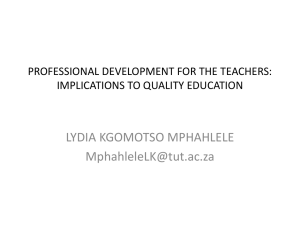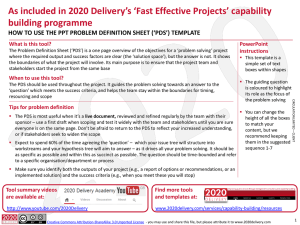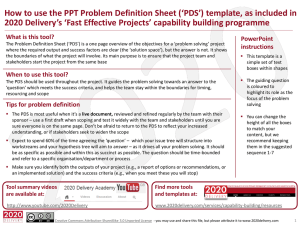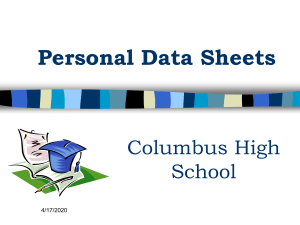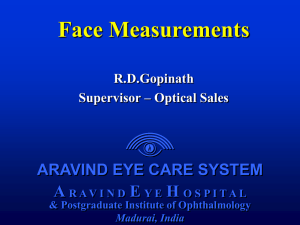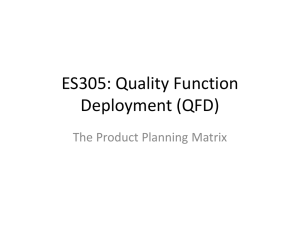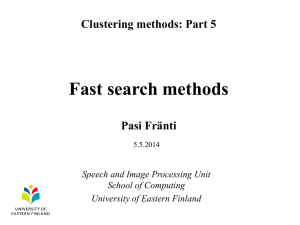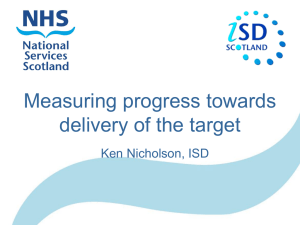Standards for Maryland Professional Development Schools
advertisement
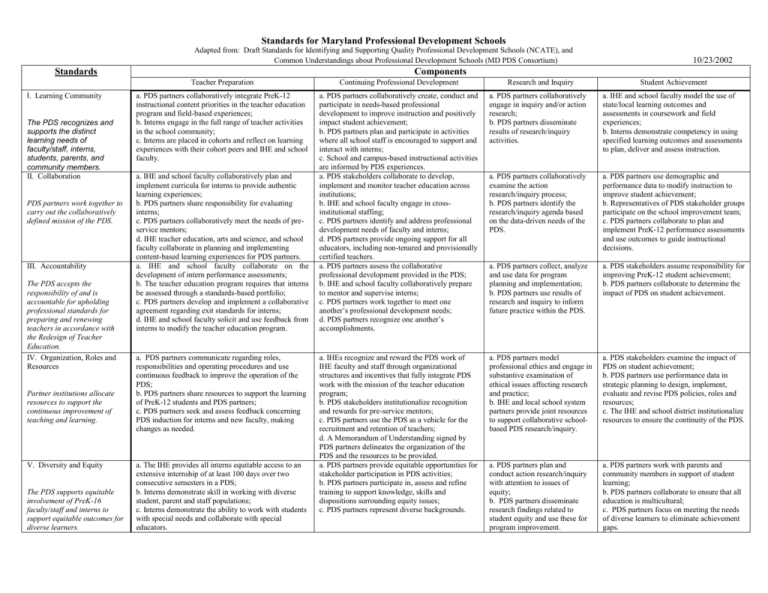
Standards for Maryland Professional Development Schools Adapted from: Draft Standards for Identifying and Supporting Quality Professional Development Schools (NCATE), and Common Understandings about Professional Development Schools (MD PDS Consortium) Standards I. Learning Community The PDS recognizes and supports the distinct learning needs of faculty/staff, interns, students, parents, and community members. II. Collaboration PDS partners work together to carry out the collaboratively defined mission of the PDS. III. Accountability The PDS accepts the responsibility of and is accountable for upholding professional standards for preparing and renewing teachers in accordance with the Redesign of Teacher Education. IV. Organization, Roles and Resources Partner institutions allocate resources to support the continuous improvement of teaching and learning. V. Diversity and Equity The PDS supports equitable involvement of PreK-16 faculty/staff and interns to support equitable outcomes for diverse learners. 10/23/2002 Components Teacher Preparation Continuing Professional Development a. PDS partners collaboratively integrate PreK-12 instructional content priorities in the teacher education program and field-based experiences; b. Interns engage in the full range of teacher activities in the school community; c. Interns are placed in cohorts and reflect on learning experiences with their cohort peers and IHE and school faculty. a. PDS partners collaboratively create, conduct and participate in needs-based professional development to improve instruction and positively impact student achievement; b. PDS partners plan and participate in activities where all school staff is encouraged to support and interact with interns; c. School and campus-based instructional activities are informed by PDS experiences. a. PDS stakeholders collaborate to develop, implement and monitor teacher education across institutions; b. IHE and school faculty engage in crossinstitutional staffing; c. PDS partners identify and address professional development needs of faculty and interns; d. PDS partners provide ongoing support for all educators, including non-tenured and provisionally certified teachers. a. PDS partners assess the collaborative professional development provided in the PDS; b. IHE and school faculty collaboratively prepare to mentor and supervise interns; c. PDS partners work together to meet one another’s professional development needs; d. PDS partners recognize one another’s accomplishments. a. PDS partners collaboratively engage in inquiry and/or action research; b. PDS partners disseminate results of research/inquiry activities. a. IHE and school faculty model the use of state/local learning outcomes and assessments in coursework and field experiences; b. Interns demonstrate competency in using specified learning outcomes and assessments to plan, deliver and assess instruction. a. PDS partners collaboratively examine the action research/inquiry process; b. PDS partners identify the research/inquiry agenda based on the data-driven needs of the PDS. a. PDS partners use demographic and performance data to modify instruction to improve student achievement; b. Representatives of PDS stakeholder groups participate on the school improvement team; c. PDS partners collaborate to plan and implement PreK-12 performance assessments and use outcomes to guide instructional decisions. a. PDS partners collect, analyze and use data for program planning and implementation; b. PDS partners use results of research and inquiry to inform future practice within the PDS. a. PDS stakeholders assume responsibility for improving PreK-12 student achievement; b. PDS partners collaborate to determine the impact of PDS on student achievement. a. IHEs recognize and reward the PDS work of IHE faculty and staff through organizational structures and incentives that fully integrate PDS work with the mission of the teacher education program; b. PDS stakeholders institutionalize recognition and rewards for pre-service mentors; c. PDS partners use the PDS as a vehicle for the recruitment and retention of teachers; d. A Memorandum of Understanding signed by PDS partners delineates the organization of the PDS and the resources to be provided. a. PDS partners provide equitable opportunities for stakeholder participation in PDS activities; b. PDS partners participate in, assess and refine training to support knowledge, skills and dispositions surrounding equity issues; c. PDS partners represent diverse backgrounds. a. PDS partners model professional ethics and engage in substantive examination of ethical issues affecting research and practice; b. IHE and local school system partners provide joint resources to support collaborative schoolbased PDS research/inquiry. a. PDS stakeholders examine the impact of PDS on student achievement; b. PDS partners use performance data in strategic planning to design, implement, evaluate and revise PDS policies, roles and resources; c. The IHE and school district institutionalize resources to ensure the continuity of the PDS. a. PDS partners plan and conduct action research/inquiry with attention to issues of equity; b. PDS partners disseminate research findings related to student equity and use these for program improvement. a. PDS partners work with parents and community members in support of student learning; b. PDS partners collaborate to ensure that all education is multicultural; c. PDS partners focus on meeting the needs of diverse learners to eliminate achievement gaps. a. IHE and school faculty collaboratively plan and implement curricula for interns to provide authentic learning experiences; b. PDS partners share responsibility for evaluating interns; c. PDS partners collaboratively meet the needs of preservice mentors; d. IHE teacher education, arts and science, and school faculty collaborate in planning and implementing content-based learning experiences for PDS partners. a. IHE and school faculty collaborate on the development of intern performance assessments; b. The teacher education program requires that interns be assessed through a standards-based portfolio; c. PDS partners develop and implement a collaborative agreement regarding exit standards for interns; d. IHE and school faculty solicit and use feedback from interns to modify the teacher education program. a. PDS partners communicate regarding roles, responsibilities and operating procedures and use continuous feedback to improve the operation of the PDS; b. PDS partners share resources to support the learning of PreK-12 students and PDS partners; c. PDS partners seek and assess feedback concerning PDS induction for interns and new faculty, making changes as needed. a. The IHE provides all interns equitable access to an extensive internship of at least 100 days over two consecutive semesters in a PDS; b. Interns demonstrate skill in working with diverse student, parent and staff populations; c. Interns demonstrate the ability to work with students with special needs and collaborate with special educators. Research and Inquiry Student Achievement
